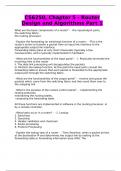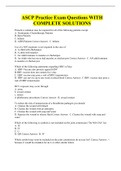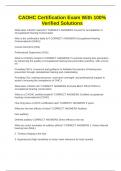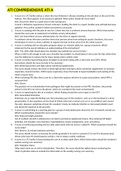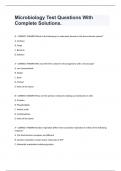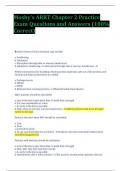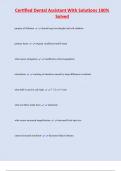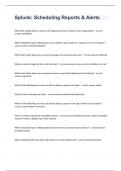CS6250, Chapter 5 - Router
Design and Algorithms Part 1
What are the basic components of a router? - -the input/output ports,
the switching fabric,
the routing processor.
-Explain the forwarding (or switching) function of a router - -This is the
router's action to transfer a packet from an input link interface to the
appropriate output link interface.
Forwarding takes place at very short timescales (typically a few
nanoseconds), and is typically implemented in hardware.
-What are the functionalities of the input ports? - -i. Physically terminate the
incoming links to the router
ii. The data link processing unit decapsulates the packets
iii. Perform the lookup function. At this point the input ports consult the
forwarding table to ensure that each packet is forwarded to the appropriate
output port through the switching fabric.
-What are the functionalities of the output ports? - -receive and queue the
packets which come from the switching fabric and then send them over to
the outgoing link
-What is the purpose of the routers control plane? - -implementing the
routing protocols,
maintaining the routing tables,
computing the forwarding table.
All these functions are implemented in software in the routing processor, or
by a remote controller.
-What tasks occur in a router? - -1. Lookup
2. Switching
3. Queueing
4. Header validation and checksum
5. Route processing
6. Protocol Processing.
-Explain the lookup task of a router - -Time Sensitive, when a packet arrives
at the destination IP and determines the output link by looking at the
forwarding table or forwarding information base (FIB). The
, -Explain the switching task of a router - -Time Sensitive, after lookup, the
switching system takes over to transfer the packet from the input link to the
output link. Modern fast routers use crossbar for this task. Scheduling can be
difficult because multiple inputs may want to send to the same output.
-Explain the Queuing task of the router - -Time Sensitive, After the switch
has been switched to a specific output, it will need to be queued (if the link is
congested). Queue may be FIFO or other.
-Explain the Header validation and checksum task of the router - -Time
insensitive, the router checks the packets version number, it decrements the
time to live field and recalculates the header checksum. Data Plane
-Explain the route processing task of the router - -Time insensitive, the
router builds their forwarding table using routing protocols such as RIP, OSPF
and BGP. These protocols are implemented in routing processors. Control
Plane
-Explain the protocol processing task of the router - -Time insensitive, the
routers, in order to implement their functions, need to implement the
following protocols (Control Plane):
i. SNMP - Remote inspection
ii. TCP and UPD - remote communication with the router
iii. ICMP - for sending error messages when time to live time is exceeded.
-Explain switching via memory - -a. Input/Output ports operate as I/O
devices in an operating system, and they are controlled by the routing
processor. When an input port receives a packet, it sends an interrupt to the
routing processor and the packet is copied to the processor's memory. Then
the processor extracts the destination address and looks into the forward
table to find the output port, and finally the packet is copied into that
output's port buffer.
-Explain switching via bus - -a. the routing processor does not intervene as
we saw the switching via memory. When an input port receives a new
packet, it puts an internal header that designates the output port, and it
sends the packet to the shared bus. Then all the output ports will receive the
packet, but only the designated one will keep it. When the packet arrives at
the designated output port, then the internal header is removed from the
packet. Only one packet can cross the bus at a given time, and so the speed
of the bus limits the speed of the router.
-Explain switching via interconnection network (Crossbar) - -Connects N
input ports to N output ports using 2N buses. Horizontal buses meet the
vertical buses at crosspoints which are controlled by the switching fabric. For
example, let's suppose that a packet arrives at port A that will need to be
Design and Algorithms Part 1
What are the basic components of a router? - -the input/output ports,
the switching fabric,
the routing processor.
-Explain the forwarding (or switching) function of a router - -This is the
router's action to transfer a packet from an input link interface to the
appropriate output link interface.
Forwarding takes place at very short timescales (typically a few
nanoseconds), and is typically implemented in hardware.
-What are the functionalities of the input ports? - -i. Physically terminate the
incoming links to the router
ii. The data link processing unit decapsulates the packets
iii. Perform the lookup function. At this point the input ports consult the
forwarding table to ensure that each packet is forwarded to the appropriate
output port through the switching fabric.
-What are the functionalities of the output ports? - -receive and queue the
packets which come from the switching fabric and then send them over to
the outgoing link
-What is the purpose of the routers control plane? - -implementing the
routing protocols,
maintaining the routing tables,
computing the forwarding table.
All these functions are implemented in software in the routing processor, or
by a remote controller.
-What tasks occur in a router? - -1. Lookup
2. Switching
3. Queueing
4. Header validation and checksum
5. Route processing
6. Protocol Processing.
-Explain the lookup task of a router - -Time Sensitive, when a packet arrives
at the destination IP and determines the output link by looking at the
forwarding table or forwarding information base (FIB). The
, -Explain the switching task of a router - -Time Sensitive, after lookup, the
switching system takes over to transfer the packet from the input link to the
output link. Modern fast routers use crossbar for this task. Scheduling can be
difficult because multiple inputs may want to send to the same output.
-Explain the Queuing task of the router - -Time Sensitive, After the switch
has been switched to a specific output, it will need to be queued (if the link is
congested). Queue may be FIFO or other.
-Explain the Header validation and checksum task of the router - -Time
insensitive, the router checks the packets version number, it decrements the
time to live field and recalculates the header checksum. Data Plane
-Explain the route processing task of the router - -Time insensitive, the
router builds their forwarding table using routing protocols such as RIP, OSPF
and BGP. These protocols are implemented in routing processors. Control
Plane
-Explain the protocol processing task of the router - -Time insensitive, the
routers, in order to implement their functions, need to implement the
following protocols (Control Plane):
i. SNMP - Remote inspection
ii. TCP and UPD - remote communication with the router
iii. ICMP - for sending error messages when time to live time is exceeded.
-Explain switching via memory - -a. Input/Output ports operate as I/O
devices in an operating system, and they are controlled by the routing
processor. When an input port receives a packet, it sends an interrupt to the
routing processor and the packet is copied to the processor's memory. Then
the processor extracts the destination address and looks into the forward
table to find the output port, and finally the packet is copied into that
output's port buffer.
-Explain switching via bus - -a. the routing processor does not intervene as
we saw the switching via memory. When an input port receives a new
packet, it puts an internal header that designates the output port, and it
sends the packet to the shared bus. Then all the output ports will receive the
packet, but only the designated one will keep it. When the packet arrives at
the designated output port, then the internal header is removed from the
packet. Only one packet can cross the bus at a given time, and so the speed
of the bus limits the speed of the router.
-Explain switching via interconnection network (Crossbar) - -Connects N
input ports to N output ports using 2N buses. Horizontal buses meet the
vertical buses at crosspoints which are controlled by the switching fabric. For
example, let's suppose that a packet arrives at port A that will need to be

